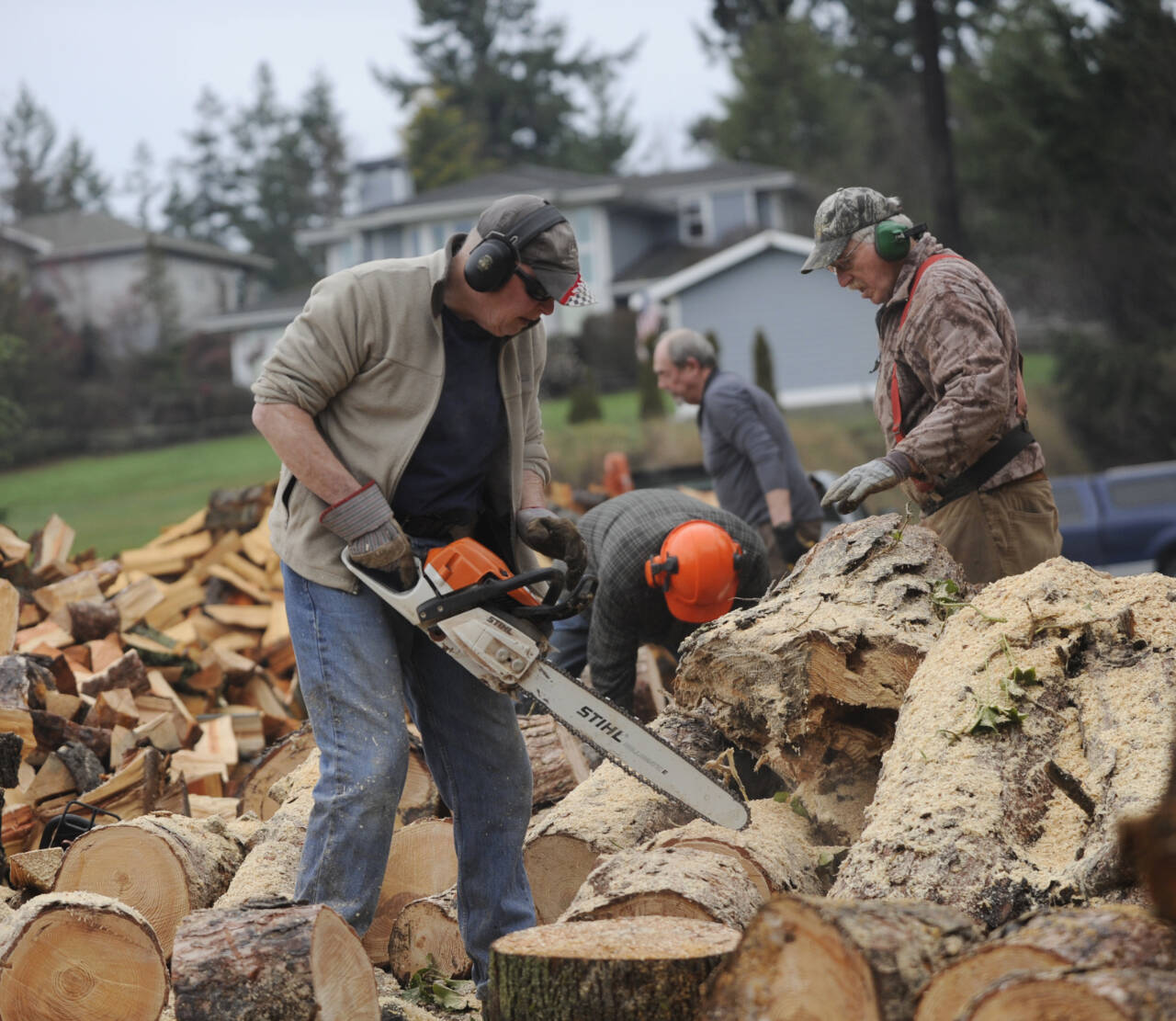They come from varying backgrounds — a boat inspector, a mason, a computer company employee and such — but this group of older men with an average age well past 70 have more than a few things in common, says group leader Jack Tatom.
One, they know how to handle an axe and a chainsaw. Two, they’re hardy, ready to split some wood in most kinds of Pacific Northwest weather. Three, they are all ready to throw their backs into the kind of labor that can help people near and far. And four, if they weren’t friends before joining this Monday morning log-splitting group, they are now.
“It started out as a money-maker for Path From Poverty,” explains Tatom who oversees the group of about a half-dozen cutting and stacking cords of wood on his property north of Sequim proper. Then, he said, it became a way to get exercise.
“Then it became a way to be with friends.”
Tatom said the group formed some years ago and was for a time associated with the Sequim Sunrise Rotary Club’s international donations.
Mary Jane Apple, who helps connect the woodcutters group with the nonprofit, said she was taking a course in spiritual direction when she got connected with Boni Pier, president of Path From Poverty’s board of directors.
A now Edmonds-based nonprofit, Path From Poverty supports a number of women’s group projects in Kenya, including: business and leadership training; clean, safe water in the form of large rainwater catchment tanks; solar power, including panels, chargers and utility packs, and education scholarships. (See pathfrompoverty.org.)
“We talked about this program and I got super excited,” Apple said, “especially as a social worker [who finds that] handouts are not effective very often. These women are really working to support themselves.”
Apple said she’s made two trips to Kenya to see the nonprofit in action, and hosted a representative and benefactor from Kenya.
“This [project] has created community for these women often in those areas,” she said. “It’s not just washing clothes, working for water. It really grew their faith [too].
“They’re successful women. They go on to do some really cool things.”
The connection paid off in another way. Along with donations from the woodcutting group, Sequim High School’s Interact Club has taken up their annual Walk For Water, which sees students and Rotarians each spring walk about four miles from Sequim Middle School to the Dungeness River and back, carrying gallons of river water to fundraise and raise awareness for those in other countries who walk numerous hours daily to gather water.
While the Rotary group, to which many of the woodcutters belong, decided to go in a different direction for their international support, Tatom said the woodcutters stayed together, keeping locals in ready supply of firewood while continuing to donate to Path From Poverty.
In the past five years, Tatom estimated the group has donated about $60,000 to Path From Poverty.
The majority of the wood is donated, he said, from Sequim-based Town & Country Tree Experts. Sometimes a local may hear about the group and ask if they can donate a tree to the effort.
“We don’t like to fall them, but occasionally we will,” Tatom said.
Developer Ron Gilles has also helped, Tatom said, by donating trees he’s clearing.
“He’s been a big help to us,” Tatom said of Gilles.
The men gather at a locale on Monday mornings, most recently on Tatom’s property, and other days as necessary, to split the wood with axes, chainsaws or a wood splitter.
“It’s mostly rain or shine,” Tatom said. “Normally the weather cooperates.”
Ages of the cutters vary a bit but the youngest ones are around 70, Tatom said, while there are at least one in their 80s and another in their 90s.
The wood is then bundled into cords — usually 4 feet tall, four feet deep and 8 feet long, for 128 cubic feet — and then sold to local customers, with the money sent on to the international aid organization.
“We have a lot of repeat customers,” Tatom said, but if there aren’t any orders he’ll go down the list of former buyers and usually someone is running low and re-ups for a cord.
It’s a nice parallel, Apple said to see community being built both in Kenya and in Sequim, where a group of hardworking older men have developed camaraderie for a cause.
“It’s glorious,” Apple said. “I just send the money [to Path From Poverty]. I’m called the mother of the woodcutters. It’s an honor. I love being affiliated with them.”



